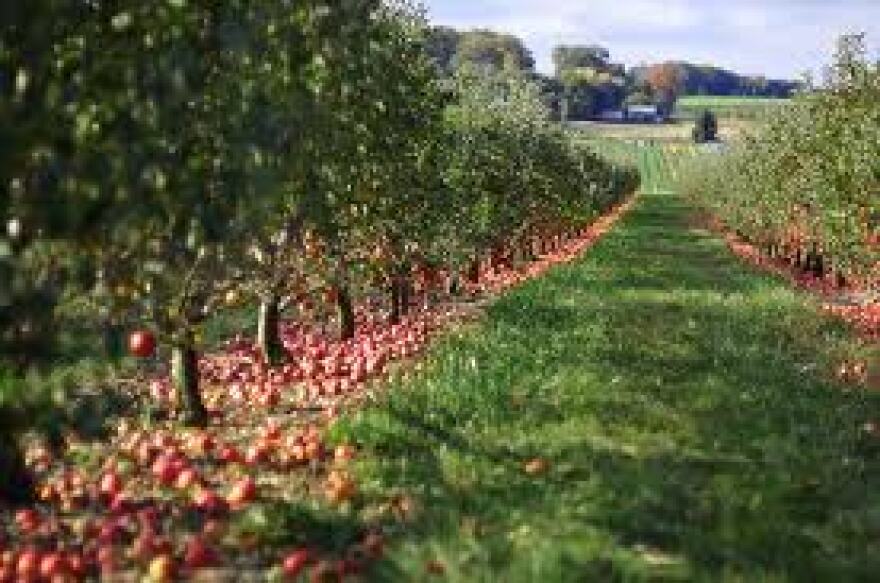As families all over New York State sit down to supper this holiday season, sweet and hard ciders will undoubtedly be on the menu at many gatherings. The industry has expanded in recent years, and in New York, recent legislation could take the hard cider industry to greater heights. Ray Biggs from the New York Reporting Project at Utica College has the story.
It’s a brisk fall Friday morning in Utica, NY, and the Nail Creek Pub has just opened for business. As the lunch crowd files in, they’ll have their choice of craft beers from New York State, but another product produced in their own backyard is beginning to make a splash. Just ask pub owner Chris Talgo.
“I like to eat and drink locally, and with all the apples that we have here it only makes sense to drink hard cider,” said Talgo.
At his pub, Talgo has witnessed firsthand the rise of hard cider, an alcoholic product produced by fermenting unfiltered apple juice. Once the preferred drink of American colonists and former President Thomas Jefferson, hard cider fell into obscurity due to increased beer production in the 1820s. Only recently has hard cider begun to make a comeback.
"This was originally built in Syracuse around 1890, 1885 and it's called a four screw press,” said Matthew Critz.
Standing in front of the large wooden apple press that helped him enter the business, Matthew Critz says he is excited about the industry's growth. Critz runs the Harvest Moon Cidery in Cazenovia. He says hard cider appeals to women, people interested in a gluten free drink, and young people who have traveled to countries that consume lots of it.
Kids go over and drink cider in England and France and Europe, where cider is 10 to 15 percent of beverage sales, and they bring those tastes back with them," said Critz.
New York State has sensed opportunity in the emerging industry. With it’s strong apple production, second only to Washington in the U.S, and the recent success of laws promoting on-site beer, wine, and liquor production by farmers, the state earlier this year extended a similar set of licensing guidelines to cider producers. The law allows growers with the license to produce of up to 150,000 gallons a year.
Sam Filler from Empire State Development explains that it is all part of a larger plan to aid New York agriculture through an emphasis on the products that can be made from crops.
“As an Orchard, instead of selling just raw apples, you can take them and turn them into a vodka, or turn them into a brandy, or turn them into a hard cider, and get even more value out of them,” Filler said.
At his Cidery, Critz does exactly that: make a purely New York product from farm to glass, and a raw product into a more valuable one. He's been doing it since 2011 and says the new law makes the industry more attractive to growers.
“Three years ago, it was like ten times as difficult. Now with the new farm cidery law, they made it way easier for a new guy to start up. It’s easy,” said Critz.
The law also changes the legal definition of a cider, which was unchanged since prohibition. It enables more flavored ciders to be sold in grocery stores, where consumers are most likely to see them. This gives rise to new creative possibilities that add even more value. Critz is testing the limits with varieties that include maple syrup, honey, fruit juice, and hops.
“As soon as we put one drop of anything but apple based product, it was no longer a cider. Now we can sweeten up to 20 percent with another fruit juice,” said Critz.
While the law helps growers get the most value from their product, Sam Filler says that cider can also create economic value beyond the farm.
“You need to hire a distiller, hire someone to market the product for you, someone to work in your warehouse,” Sam Filler.
Back at his pub, Chris Talgo also has high hopes for the new law, and the creative freedom it allows.
"Variety is the key to our pub here. We try to bring in as many different beers and as many different ciders as we can, so the more variety and the more options that we have, the better off we're going to be," said Talgo.
The hard cider industry is already worth over $600 million and growing. For producers in New York and nationally, optimism is what's on tap.
Ray Biggs is with the New York Reporting Project at Utica College and can be found at www.nyrp-uc.org


